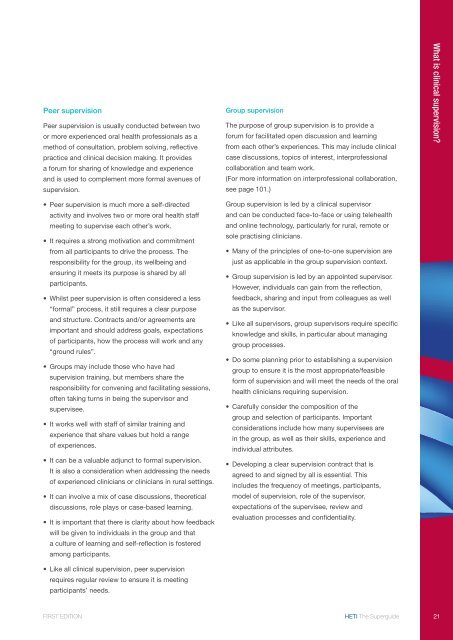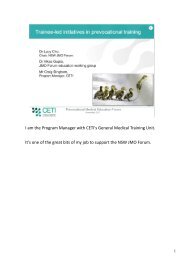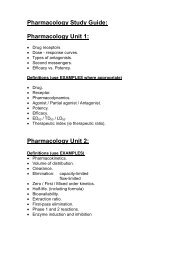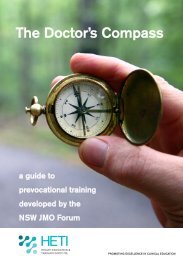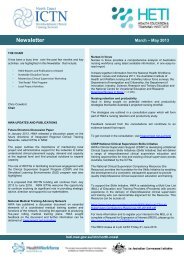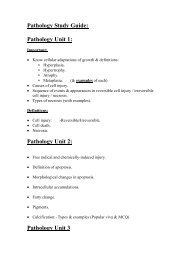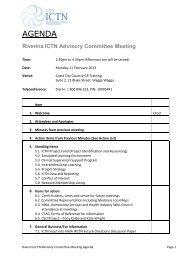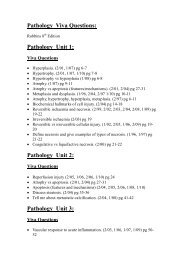Open - HETI - NSW Government
Open - HETI - NSW Government
Open - HETI - NSW Government
- No tags were found...
You also want an ePaper? Increase the reach of your titles
YUMPU automatically turns print PDFs into web optimized ePapers that Google loves.
Peer supervisionPeer supervision is usually conducted between twoor more experienced oral health professionals as amethod of consultation, problem solving, reflectivepractice and clinical decision making. It providesa forum for sharing of knowledge and experienceand is used to complement more formal avenues ofsupervision.Group supervisionThe purpose of group supervision is to provide aforum for facilitated open discussion and learningfrom each other’s experiences. This may include clinicalcase discussions, topics of interest, interprofessionalcollaboration and team work.(For more information on interprofessional collaboration,see page 101.)What is clinical supervision?• Peer supervision is much more a self-directedactivity and involves two or more oral health staffmeeting to supervise each other’s work.• It requires a strong motivation and commitmentfrom all participants to drive the process. Theresponsibility for the group, its wellbeing andensuring it meets its purpose is shared by allparticipants.• Whilst peer supervision is often considered a less“formal” process, it still requires a clear purposeand structure. Contracts and/or agreements areimportant and should address goals, expectationsof participants, how the process will work and any“ground rules”.• Groups may include those who have hadsupervision training, but members share theresponsibility for convening and facilitating sessions,often taking turns in being the supervisor andsupervisee.• It works well with staff of similar training andexperience that share values but hold a rangeof experiences.• It can be a valuable adjunct to formal supervision.It is also a consideration when addressing the needsof experienced clinicians or clinicians in rural settings.• It can involve a mix of case discussions, theoreticaldiscussions, role plays or case-based learning.• It is important that there is clarity about how feedbackwill be given to individuals in the group and thata culture of learning and self-reflection is fosteredamong participants.• Like all clinical supervision, peer supervisionrequires regular review to ensure it is meetingparticipants’ needs.Group supervision is led by a clinical supervisorand can be conducted face-to-face or using telehealthand online technology, particularly for rural, remote orsole practising clinicians.• Many of the principles of one-to-one supervision arejust as applicable in the group supervision context.• Group supervision is led by an appointed supervisor.However, individuals can gain from the reflection,feedback, sharing and input from colleagues as wellas the supervisor.• Like all supervisors, group supervisors require specificknowledge and skills, in particular about managinggroup processes.• Do some planning prior to establishing a supervisiongroup to ensure it is the most appropriate/feasibleform of supervision and will meet the needs of the oralhealth clinicians requiring supervision.• Carefully consider the composition of thegroup and selection of participants. Importantconsiderations include how many supervisees arein the group, as well as their skills, experience andindividual attributes.• Developing a clear supervision contract that isagreed to and signed by all is essential. Thisincludes the frequency of meetings, participants,model of supervision, role of the supervisor,expectations of the supervisee, review andevaluation processes and confidentiality.FIRST EDITION<strong>HETI</strong> The Superguide21


